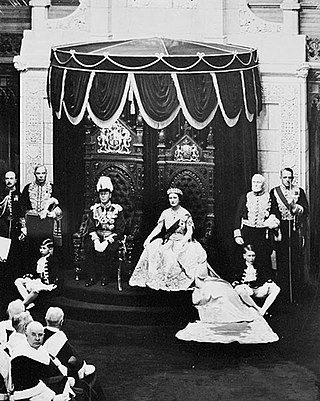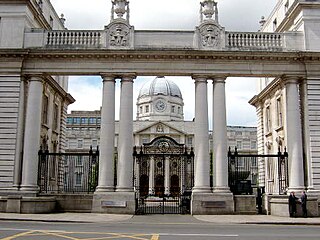
Cloture, closure or, informally, a guillotine, is a motion or process in parliamentary procedure aimed at bringing debate to a quick end.

The Parliament of Canada is the federal legislature of Canada, seated at Parliament Hill in Ottawa, and is composed of three parts: the King, the Senate, and the House of Commons. By constitutional convention, the House of Commons is dominant, with the Senate rarely opposing its will. The Senate reviews legislation from a less partisan standpoint and may initiate certain bills. The monarch or his representative, normally the governor general, provides royal assent to make bills into law.

The Senate of Canada is the upper house of the Parliament of Canada. Together with the Crown and the House of Commons, they compose the bicameral legislature of Canada.

Royal assent is the method by which a monarch formally approves an act of the legislature, either directly or through an official acting on the monarch's behalf. In some jurisdictions, royal assent is equivalent to promulgation, while in others that is a separate step. Under a modern constitutional monarchy, royal assent is considered little more than a formality. Even in nations such as the United Kingdom, Norway, the Netherlands, Liechtenstein and Monaco which still, in theory, permit their monarch to withhold assent to laws, the monarch almost never does so, except in a dire political emergency or on advice of government. While the power to veto by withholding royal assent was once exercised often by European monarchs, such an occurrence has been very rare since the eighteenth century.

A quorum is the minimum number of members of a group necessary to constitute the group at a meeting. In a deliberative assembly, a quorum is necessary to conduct the business of that group. According to Robert's Rules of Order Newly Revised, the "requirement for a quorum is protection against totally unrepresentative action in the name of the body by an unduly small number of persons." In contrast, a plenum is a meeting of the full body. A body, or a meeting or vote of it, is quorate if a quorum is present.
Parliamentary immunity, also known as legislative immunity, is a system in which political leadership position holders such as president, vice president, minister, governor, lieutenant governor, speaker, deputy speaker, member of parliament, member of legislative assembly, member of legislative council, senator, member of congress, corporator, councilor etc. are granted full immunity from legal prosecution, both civil prosecution and criminal prosecution, in the course of the execution of their official duties.
Official party status refers to the Westminster practice which is officially used in the Parliament of Canada and the provincial legislatures of recognizing parliamentary caucuses of political parties. In official documents, this is sometimes referred to as being a recognized party.

The Parliament of Southern Ireland was a Home Rule legislature established by the British Government during the Irish War of Independence under the Government of Ireland Act 1920. It was designed to legislate for Southern Ireland, a political entity which was created by the British Government to solve the issue of rising Irish nationalism and the issue of partitionism, while retaining the whole of Ireland as part of the United Kingdom.
Parliamentary privilege is a legal immunity enjoyed by members of certain legislatures, in which legislators are granted protection against civil or criminal liability for actions done or statements made in the course of their legislative duties. It is common in countries whose constitutions are based on the Westminster system.

The Constitution Act, 1867, originally enacted as the British North America Act, 1867, is a major part of the Constitution of Canada. The act created a federal dominion and defines much of the operation of the Government of Canada, including its federal structure, the House of Commons, the Senate, the justice system, and the taxation system. In 1982, with the patriation of the Constitution, the British North America Acts which were originally enacted by the British Parliament, including this Act, were renamed. However, the acts are still known by their original names in records of the United Kingdom. Amendments were also made at this time: section 92A was added, giving provinces greater control over non-renewable natural resources.

The Canadian Oath of Allegiance is a promise or declaration of fealty to the Canadian monarch—as personification of the Canadian state and its authority, rather than as an individual person—taken, along with other specific oaths of office, by new occupants of various federal and provincial government offices; members of federal, provincial, and municipal police forces; members of the Canadian Armed Forces; and, in some provinces, all lawyers upon admission to the bar. The Oath of Allegiance also makes up the first portion of the Oath of Citizenship, the taking of which is a requirement of obtaining Canadian nationality.
Blasphemous libel was originally an offence under the common law of England. Today, it is an offence under the common law of Northern Ireland, but has been abolished in England and Wales, and repealed in Canada and New Zealand. It is a form of criminal libel that consists of the publication of material which exposes the Christian religion to scurrility, vilification, ridicule, and contempt, with material that must have the tendency to shock and outrage the feelings of Christians.
In the Westminster system, a money bill or supply bill is a bill that solely concerns taxation or government spending, as opposed to changes in public law.

Parliament of Sierra Leone is the legislative branch of the government of Sierra Leone. It is principally responsible for making laws. The Sierra Leone parliament consists of 149 members, of which 135 members are directly elected from across Sierra Leone's 16 districts, while 14 are paramount chiefs appointed from the 14 rural districts. The parliament is led by the Speaker of the House; the position is currently held by Abass Bundu of the Sierra Leone People's Party. The current elected 135 ordinary members of parliament are composed of members of the All People's Congress and the Sierra Leone People's Party which are the two largest political parties in Sierra Leone.

The Parliament of Antigua and Barbuda consists of the King of Antigua and Barbuda, the Senate and the House of Representatives.
In countries with a parliamentary system of government, contempt of parliament is the offence of obstructing the legislature in the carrying out of its functions, or in the hindering any legislator in the performance of their duties.

The Constitution of Barbados is the supreme law under which Barbados is governed. The Constitution provides a legal establishment of the Government of Barbados, as well as legal rights and responsibilities of the public and various other government officers. The Constitution which came into force in 1966 was amended in 1974, 1980, 1981, 1985, 1989, 1990, 1992, 1995, 2000, 2002, 2003, 2005, 2007, 2009, 2010, 2018, 2019, 2020 and 2021. The 1966 document succeeds several other documents concerning administration of Barbados. One of them, the Barbados Charter, is discussed in the present Constitution's Preamble. Prior statutes were created for the administration of Barbados as a colony. As a former English and later British colony, the Constitution is similar to those of other former Commonwealth realms, yet distinctly different in the spirit of the Statute of Westminster.

A member of Parliament is a term typically used to describe an elected politician in the House of Commons of Canada, the lower chamber of the bicameral Parliament of Canada.

The Oaths Act, 1873, was a statute passed by the Parliament of Canada in 1873 which authorized any committee of the Senate or House of Commons to examine witnesses under oath.

Section 128 of the Constitution Act, 1867 is a provision of the Constitution of Canada relating to the oath of allegiance for members of the Senate and the House of Commons of Canada, as well as members of the provincial legislative assemblies. The section also requires members of the Senate to make a declaration of qualification. The texts of the oath and the declaration of qualification are set out in the Fifth Schedule of the Act. The section also applied to members of the provincial legislative councils, but since they have all been abolished, it no longer has any application in that regard.














